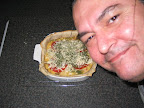"They have God on their side - we only have science and reason." (Internet graffiti)
Music and spirituality are ubiquitous, uniquely human experiences. Manifestations of both, separately and together, have been revealed not just across cultures, but also across epochs of time. However, despite all the evidence we have as to the existence of music and spirituality, and of their frequently conjoined nature, no human culture has developed the language skills necessary to adequately define or explain the existence and purpose of either.
Historically, the favored explanation for the existence of music and its purpose has been to ascribe it supernatural powers. Plato, an erstwhile man of science and reason in every other respect, described music as something that '
speaks directly to the soul.' Despite the intervening score of centuries and several hundred years of
enlightenment, thinkers of the nineteenth century Romantic-era still endorsed Plato's concept of music (and by extension, composers and virtuoso performers) as something divinely inspired. It's also the case that this concept of musical divinity has existed and continues to exist in equal measure in non-Western cultures.
There has been a parallel thread through history with regard to spirituality. While for many cultures, spirituality has been an abstract handmaiden of religious institution; those who don't subscribe to or observe orthodox religious practice still regard spirituality as something mystical. Even those with atheistic viewpoints or who reject the notion of spirituality altogether struggle to define exactly what it is they're rejecting.
All of this is mentioned, firstly to assert that both music and spirituality are naturally occurring phenomena and secondly, to set up a framework for the following argument.
In recent years, with the benefit of advanced technologies such as brain scanning imagery, science is able to examine music as a physical and thus observable phenomenon. That being the case, if spirituality is closely connected to music as it often is and has been throughout history, then perhaps the spiritual phenomenon is equally observable.
Aniruddh Patel[1], a pioneer researcher in the (relatively) new field of music-neuroscience, has evidence to suggest that music affects people in a very interesting way. This in itself isn't a startling revelation, as the physiological responses to music have been widely accepted as fact for many years now. However, what Patel has discovered is that the intense emotional response people can experience (tingling of the spine, etc.) when listening to instrumental music, with no external association such as lyrics, comes from stimulation to a number of areas in the brain, but two in particular.
One interesting area of the brain Patel found[2] to be stimulated by music was that which controlled body-motor function, more simply stated as '
movement'. Humans, unlike any other species (except for parrots - outside the scope of this essay), appear to be physiologically predisposed to synchronize their movements to music.
Similarly, many religious and spiritual practices involve some form of kinetic action, whether as a ritualized response to sermons, mantras and so on, or as an involuntary response such as swaying to the rhythms of songs of praise.
The second and even more interesting stimulation is to an area Patel called "key reward centers" - an area that neurologically through the release of dopamine creates the sensation of pleasure. This area usually does this in response to important biological behaviors, such as eating or reproducing. In other words, music stimulates the same area of the brain that plays a key role in human survival.
Likewise, there is no doubt that what people call intense spiritual experiences can excite the human body's nervous system with reactions such as tingles and shivers of the spine to create euphoric states of consciousness. In fact, general consensus anecdotally to the question, "
what defines a spiritual experience?", is that it embodies notions of 'feeling good' and other manifestations of intrinsic pleasure.
If it's the case that these reactions emanate from the same neurological location as those that occur for music, then it could be said that spiritual experience has the same biological importance as does music, eating, and sex.
In conclusion, the inferences that could be drawn here are that spiritual experience as manifest in such physiological reactions aren't a mysterious, supernatural thing. More than this, such experiences are biologically important to the survival of human species.
1
http://vesicle.nsi.edu/public/news/nsi101005.pdf2
http://video.google.com/videoplay?docid=-1267626298712917200











